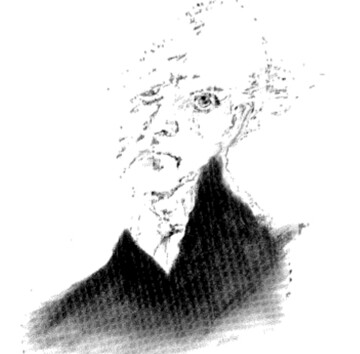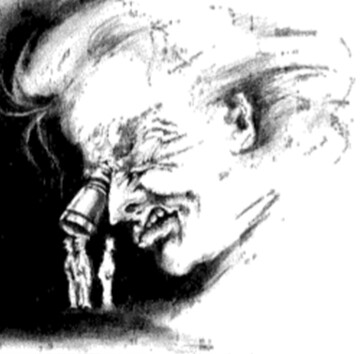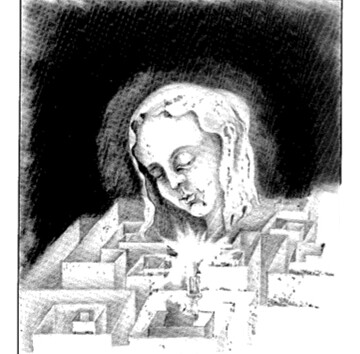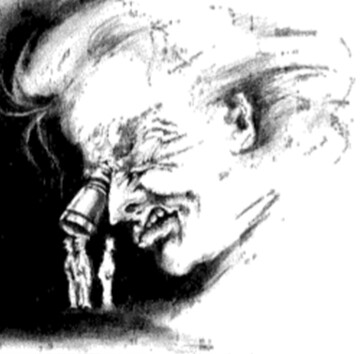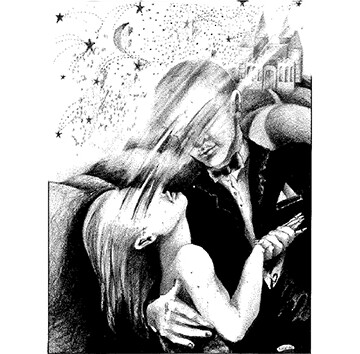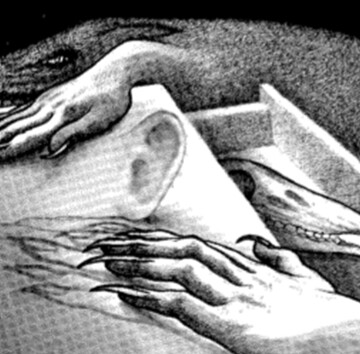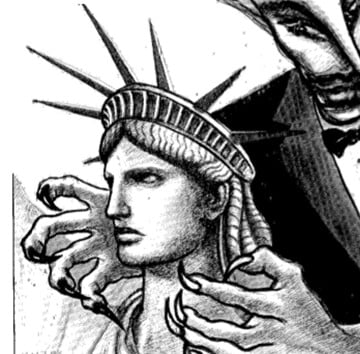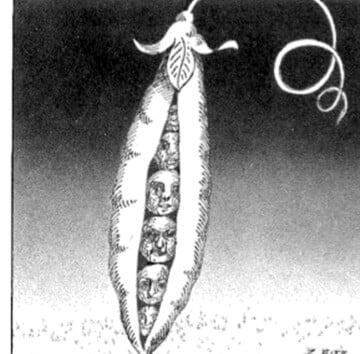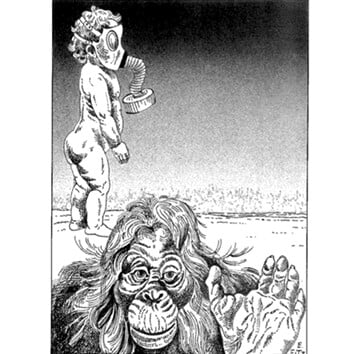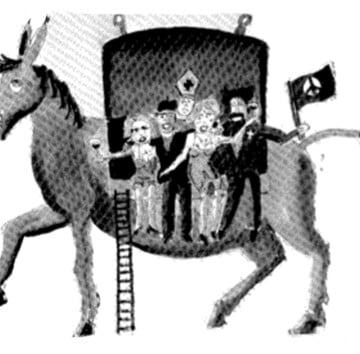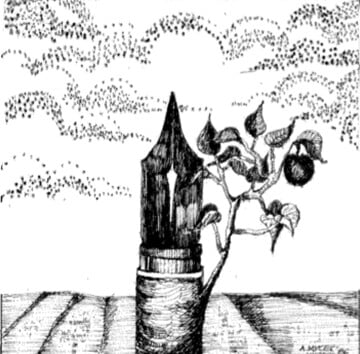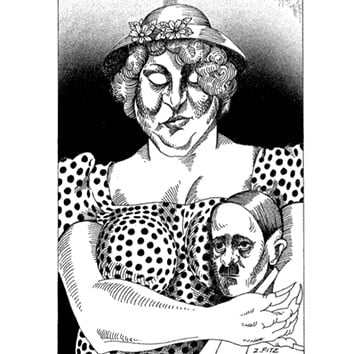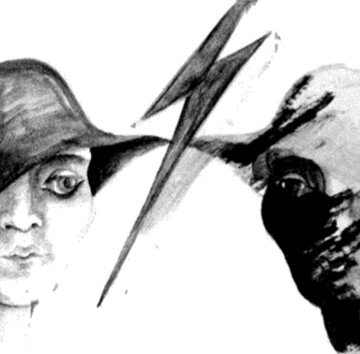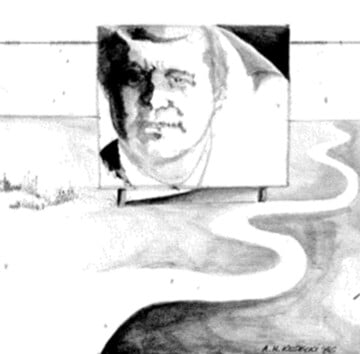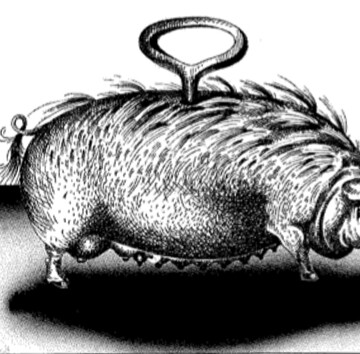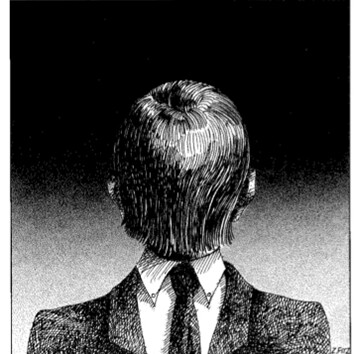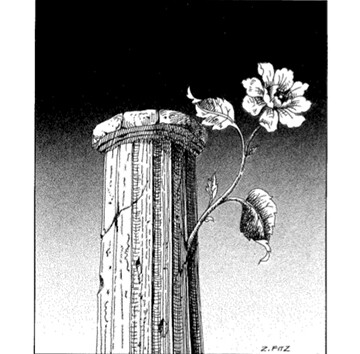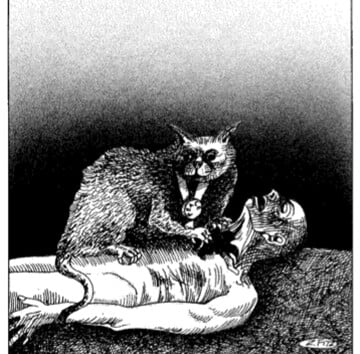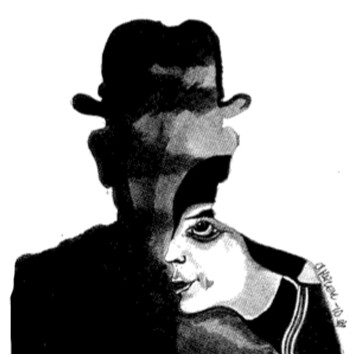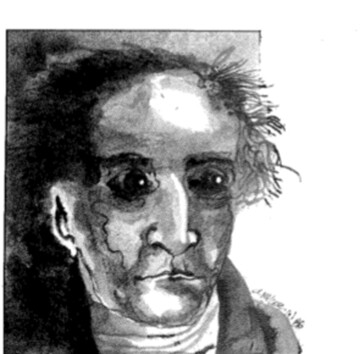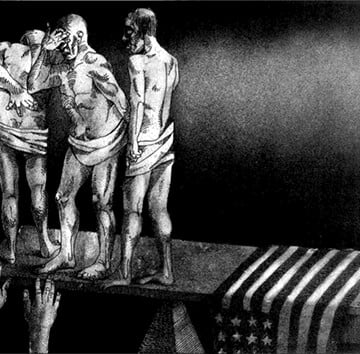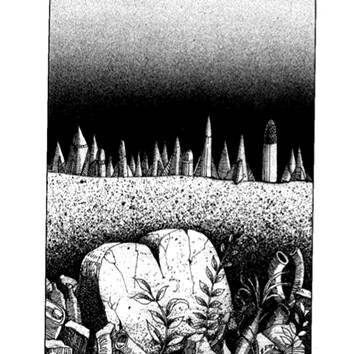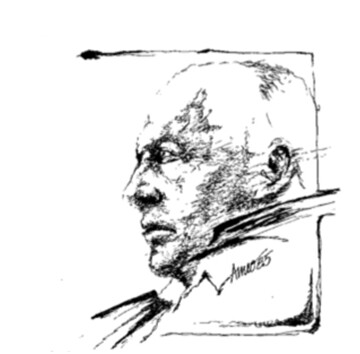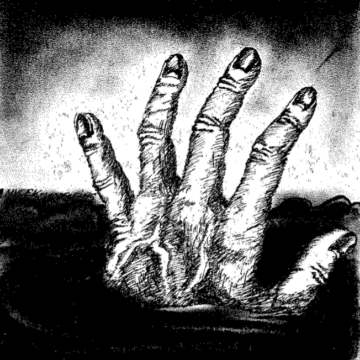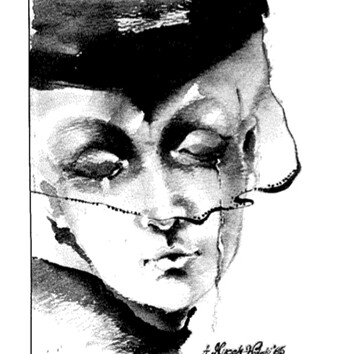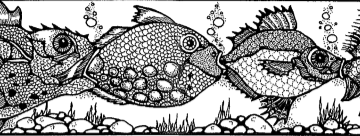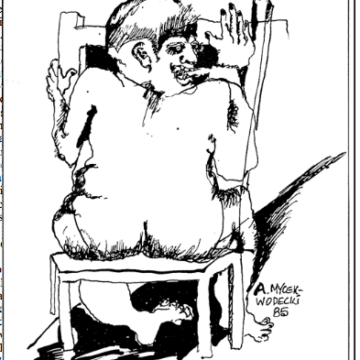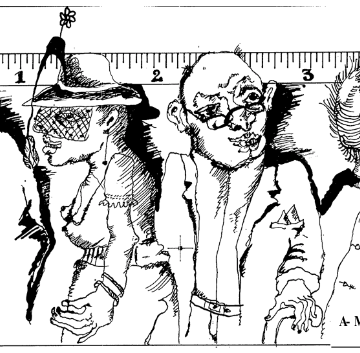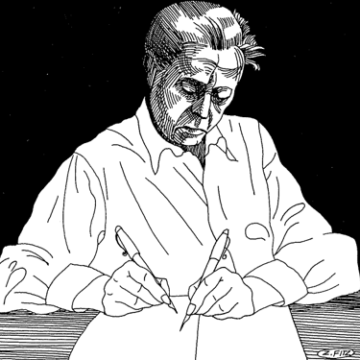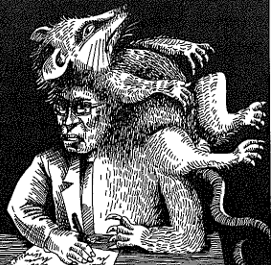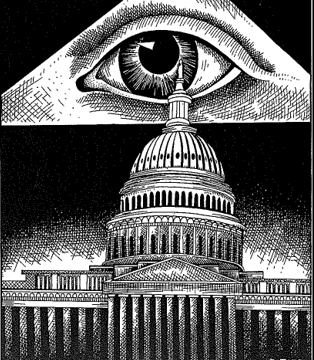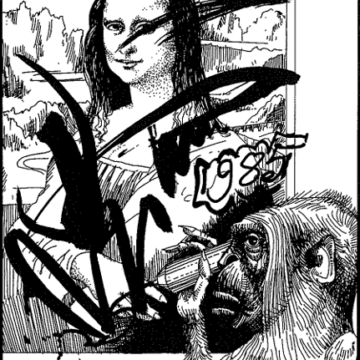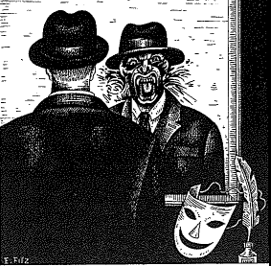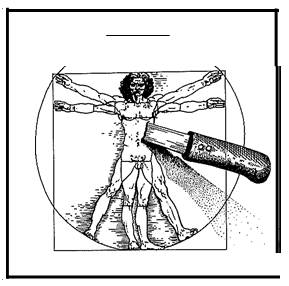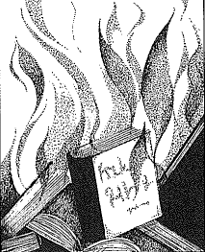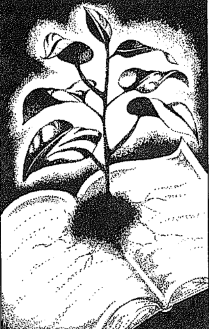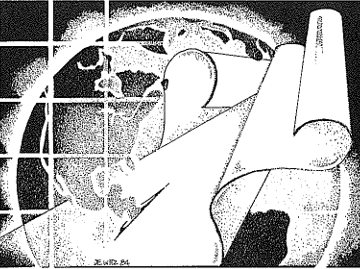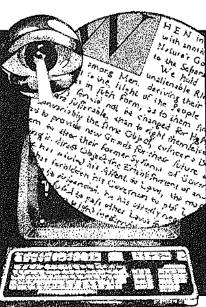The most widely known of Merseyside philosophers was never a full-time academic. But he gave classes for the Workers Educational Association from 1912, extra-mural lectures on philosophy from the 20’s, gained his Ph.D. in Liverpool in 1925 (in philosophical psychology), and was an active and famous philosopher till he died, in 1950. Olaf Stapledon was...
Category: Web
David Jones: The Last Liturgical Poet
The Welsh poet David Jones (1895-1974) wrote two of this century’s outstanding literary works, and yet neither a single line of his writing nor any mention of his name is included in so recent a collection as The Harper Anthology of Poetry (1981), an otherwise excellent volume of English and American verse edited by the...
The Search For the Sacred
Religion is inseparable from the sacred, the channel through which the divine transcendent communicates with man, according to man’s sensate nature. Any object, natural or man-made—a Gothic cathedral or the lapis negra excavated on the Roman forum—may assume the character of sacredness. Through it, the divine communication becomes incarnated, and, in the intellectual-rational order, verities...
Orwell and Religion
In his novel 1984, George Orwell created a world devoid of freedom and justice, truth and goodness. But there is another void in the book that critics seldom notice: the utter lack of religious faith. The absence of any vestige of religion seems to Christianity’s advantage: The Orwellian world is such a desolate, inhuman, and...
The Novel and the Imperial Self
Preoccupation with the state of the novel was until about 10 years ago one of the major bores of American criticism. From the early 1950’s well into the 60’s, it was scarcely possible to get through a month without reading as a rule in the Sunday book review supplements or the editorial page of Life—that...
Faces of Clio
“The obscurest epoch is today.” —Robert Louis Stevenson Taken together, these three books serve nicely as a kind of group portrait of Clio and her several faces. In reverse order we have the historian as diarist and memoirist, as documentarian, and as reflective sage. As one of the learned species, historians, it has always seemed...
The Doors of Deception
One of the many sociological uses of Hollywood is its dramatic availability when things go wrong in America. Michael Satchell, for instance, has raised the question in Parade of whether the movies by too often glamorizing drugs and alcohol encourage their use among young people. He cites Goldie Hawn, Jane Fonda, Dolly Parton, Lily Tomlin,...
Modern Conservatism and the Burden of Joe McCarthy
Many political experts have attempted to explain the rise of the right in recent years. At the close of World War II there was no unified, articulate conservative movement in the United States. Forty years later, Ronald Reagan was serving his second term in the White House, scores of conservative organizations were wealthy and growing,...
The Evil That Men Don’t Do: Joe McCarthy and the American Right
His is probably the most hated name in American history. Other villains—Benedict Arnold, Aaron Burr, Alger Hiss, Julius and Ethel Rosenberg—today evoke merely the esoteric passions of the antiquarian or the interminable controversies of partisans. Only Joe McCarthy has given his name to an enduring term of political abuse, and in American politics today there...
On Genetic Determinism and Morality
In his recent speech to Congress, Anatoly Shcharansky said, “All understanding between the East and West must be based on human values common to all men.” This appealing statement takes us straight to the central question of moral reasoning: What, if anything, are common human values? Humanity is and always has been faced with a...
Monkeys and Machine-Guns: Evolution, Darwinism, and Christianity
It often happens that when a Greek or Latin word is given a new lease on life in one of the major modern languages, and especially in English, the original meaning of the word may be replaced by a rather different one. This is particularly the case when a word, which was a strongly transitive...
Trojan Asses
“Then unbelieving Priests reform’d the nation, And taught more pleasant methods of salvation.” —Alexander Pope, An Essay on Criticism On April 22, 1950, I published in the London Tablet an article entitled “The American Catholics Revisited,” which provoked an avalanche of letters to the editor, wildly protesting against my observations. Nearly all of them came...
The Poet and the Plowman
Surprisingly often we talked about Vergil, usually about the Aeneid, but sometimes about the Georgics, and then with the wry sentimental fondness of old students who had been made, not quite willingly, to go to school to the poem. And during the plentiful longueurs of the Redskin games of the mid-1960’s, we would regret that...
Sexual Politics
The 1980’s witnessed one of the greatest miracles in the history of American politics and the climactic triumph of one of the most effective political leaders ever to emerge in America. That leader was a woman, and however well-known she is today, she has never achieved the honor and celebrity of her many inferiors. The...
Equal Opportunity and the Limits of Liberalism
The last two decades have seen a remarkable revival in academic political philosophy, particularly in the English-speaking world. A subject which was widely pronounced dead in the 1950’s has recently produced thousands of articles and numerous books of real importance. One indicator of the scale of this revival is the length of a recently published...
John F. Kennedy: Character and Camelot
John F. Kennedy first gained national attention at the age of 23. His book Why England Slept, published in 1940, became a best-seller and earned the new Harvard graduate plaudits as a man of learning and thoughtfulness. Kennedy was heard from again in the summer of 1944 when the New York Times carried a front-page...
The “Melting” Experience: Grow or Die
I have a friend, a Boston thoracic surgeon, who has a great sensitivity for issues concerning the meaning of life and the nature of man. It’s easy to understand how a man who spends the best part of his busy days at the pressure-packed juncture of life and death could become absorbed in philosophical thought....
The Unnatural History of Giant Ideology
Born in a Parisian coffeehouse during the first year of the 19th century, Ideology has grown gigantic in our time. Infant Ideology was consecrated to an educational reform; the colossus Ideology that now bestrides the world is engaged successfully in the extirpation of culture. There comes to my mind often, when someone innocently utters such...
The Lure of Youth
In the early 1920’s, Wyndham Lewis began to discern the makings of a trend. Virtually everywhere he looked—and particularly in novels, newspapers, and magazines—Lewis found writing that retailed the wonders of childishness, precocity, and primitive energy; that implied, too, that life was quite finished at, say, 35. Lewis devotes The Doom of Youth (1932) to...
Let Me Count the Ways: What to Make of Survey Research
“Things and actions are what they are, and the consequences of them will he what they will he: why then should we desire to be deceived?” —Joseph Butler, Fifteen Sermons No doubt many of us could think of an answer or two to His Grace’s rhetorical question, but the case for social science—any science, for...
The Most Unbelievable Thing
The following is the text of Professor Nisbet’s speech at the 1985 Ingersoll Prizes Awards Banquet: One of Hans Christian Andersen’s lesser-known stories bears the title “The Most Unbelievable Thing.” A king offered a fortune to the subject who created the most unbelievable thing in the arts. Competition was intense and prolonged. When at last...
The Doctors and the Bomb
The furor caused by the 1985 Nobel Peace Prize to the International Physicians for the Prevention of Nuclear War, represented by its two leading sponsors and leaders. Dr. Bernard Lown of the United States and Dr. Yevgeny Chazov of the Soviet Union, provides a fine opportunity to review the revival of the politics of nuclear...
Realism and the Spirit
The following is the text of M. Ionesco’s address at the 198S Ingersoll Prizes Awards Banquet: I am extremely proud and honored to have been awarded the very prestigious T. S. Eliot Prize, which has been given to such persons as Jorge Luis Borges and the novelist Anthony Powell, artists who exemplify the prime values...
Simple Goethe
Last summer, I read simultaneously Goethe’s Dichtung und Wahrheit, his autobiography up to the time of writing Werther, his collected travel diaries, and his life by Emil Ludwig. Of the three biographical works, my unhesitating judgment is that Ludwig’s book is the disappointment: it compares to Goethe’s own narrative of his youth as the description...
The Promise of Life
“Give them hope, so they may fear.” —The Apocrypha There is no more Atlantis. “Where,” I was asked in prison, by a Yugoslav State Security agent, “is this Atlantis you would like to live in, Selic?” I didn’t tell him that I wanted to live in America, it being alive and well, and still above...
War, Peace, and the Church’s Teaching
The amazing thing about the nuclear debate and the Catholic bishops’ participation in it is that the accumulated wisdom and experience of mankind, as well as the Church’s pronouncements on peace and war, are so completely ignored. This is quite a natural phenomenon on the part of so many lay debaters: it belongs also to...
Still In Saigon—In My Mind
“The earth outside is covered with snow and I am covered with sweat. My younger brother calls me a killer and my daddy calls me a vet.” So the Vietnam veteran appears in a popular song recorded a few years back by Charlie Daniels (written by Dan Daley). The Vietnam War is over, but the...
Henry James at the Sacred Fount
It has long been self-evident that Henry James was thoroughly apolitical in any practical sense of the term. He did not involve himself in public affairs as such and hardly took more than passing notice of the Civil War, even though his two younger brothers, Wilkinson and Robertson James, served with distinguished records in the...
Russia’s Bloody Gold
“Lasciate ogni speranza” —Inferno, by Dante Alighieri The history of gold mining in Russia—a record of the greatest abuses of human rights ever perpetrated—has seldom been told. The use of slave labor in state-owned Russian mines goes back to the 19th century, when Lithuanian, Polish, and Ukrainian patriots who rebelled against Russian occupation were put...
Bianca and the Commissar
I was reading at the Periodicals Room of Yale’s Sterling Memorial Library the other day. The magazine I happened to pick up was called Soviet Literature, subtitled “A Monthly Journal of the Writers’ Union of the U.S.S.R. published in English, French, German, Spanish, Hungarian, Polish, Czech, and Slovak.” The issue, for March 1985, “marked the...
Rights of the Wild and Tame
Conservationists tend to be shy of using any arguments but the merely “economic,” partly in the odd belief that these are more “rational” than other and overtly “sentimental” ones, and partly because “economic” reasoning seems likely to appeal to a larger audience.Economic arguments are not bad ones: it is indeed incompatible with any sort of...
Do Animals Have Rights?
In recent years we have seen a growing phenomenon dubbed, not very surprisingly, the animal liberation movement. The main theoretician of animal rights is Professor Tom Regan, professor of philosophy at North Carolina State University. Other supporters from the theoretical side are Professor Peter Singer, of La Trobe University in Australia, although Singer speaks only...
The Conservative Counterrevolution
The term counterrevolution was always used by Lenin and his associates in a pejorative sense. In the Marxist view, since “progress” is irreversible, any gains made by the left are to be considered permanent, while any gains made by the right are to be considered temporary setbacks. The contemporary treatment of revolution and counterrevolu tion in...
Calhoun and Community
In any discussion of the Old Federalism—at least among that minority whose substantive knowledge of American principles and ideals precedes the beginning of the Kennedy dynasty—the name of John C. Calhoun and his idea of the concurrent majority is likely to come up. Calhoun’s reputation as a political thinker has had its ups and downs. Widely praised in his...
The Return of the Grand Inquisitor
“Without the spiritual rebirth no political changes will make people free. But the spiritual rebirth, a Christian rebirth, is the ascent of a free man, and not of Russian nationalism, the cult of homeland, fatherland, and one’s country.” -Mihajlo Mihajlov in “Some Timely Thoughts” (written in 1974 in response to Letter to the Soviet...
Revolution on the Right: The End of Bourgeois Conservatism?
In the early months of 1985, national headlines recounted lurid tales of an impending right-wing bloodbath in the United States. In New York City Bernhard Goetz admitted to the shooting of four Blacks who he believed were about to assault him on a subway car, and he promptly became a national hero. In the Washington...
Novelizing Novelists
Thrice-rendered Enderby slenderly lives again. In the 1974 novel, The Clockwork Testament, Anthony Burgess dispatched to eternity his gross, grotty, gastric poet; New York City slaughtered the luckless English bard with a heart attack. But here he is again in Enderby’s Dark Lady. “I think we have to look at it this way,” Burgess says. “All fictional events...
European Anti-Americanism: Nothing New on the Western Front
I visited Western Europe recently to learn more about the critical attitudes of intellectuals and other opinion makers (primarily academics and journalists) toward the United States. I was especially interested in how such European critiques resembled those produced by American intellectuals. I also wanted lo learn something about the connections between animosity toward the U.S....
Genes & Jingo
Popular journalists have begun writing off the sociobiology revolution. “Can Sociobiology Be Saved? and quote the learned opinions of Stephen J. Gould and Ashley Montagu (would they lie?). They indulge in vaguely worded smears: Konrad Lorenz was a nazi, E. O. Wilson is a Southerner, and sociobiology is a code word for racism among members...
The Mind of a Manichean
In 1980 Czeslaw Milosz was awarded the Nobel Prize for Literature. At the time he had been living in Berkeley, California, for just over 20 years. But it is safe to say that until Milosz became a Nobel laureate,very few readers of serious literature were on even the most casual terms with his poetry, or with...
De Gaulle: Man With a Chest
“The head rules the belly through the chest,” C. S. Lewis writes. Reason cannot rule appetites directly; it needs what the Greeks called thymos, the soul’s “spirited element,” to rule the appetites so that reason can go free. Spiritedness cares for oneself and for those like oneself. Refined, it animates patriotism, courage, honor; at its...
The Ingersoll Prizes
“In the long reach of history, it is the cultural institutions which mark the city of enlightenment, not its generals nor its statesmen nor its entrepreneurs.” So declared Dr. John A. Howard, president of The Ingersoll Foundation and of The Rockford Institute, as he welcomed leading scholars, critics, business executives, and patrons of the arts...
Waste of Money
Lucrative Lying John Barth: The Friday Book: Essays and Other Nonfiction; G.P. Putnam’s Sons; New York “For the writer intent on truth,” Solzhenitsyn observes, “life never was, never is (and never will be!) easy: his like have suffered every imaginable harassment—defamation, duels, a shattered family life, financial ruin or lifelong unrelieved poverty, the madhouse, jail.”...
The Radical Virus
Tom Schachtman: Decade of Shocks: Dallas to Watergate, 1963-1974; Poseidon Press; New York. Allen J. Matusow: The Unraveling of America: A History of Liberalism in the 1960’s; Harper & Row; New York. Pity the lot of the American radical of recent vintage. Never does the opportunity arise for him to spill his blood...
These Foolish Things
Barbara W. Tuchman: The March of Folly: From Troy to Vietnam; Alfred A.K Knopf, New York. William L. Shirer: 20th Century Journey: A Memoir of a Life and the Times. Volume II: The Nightmare Years, 1930-1940; Little, Brown & Company, Boston. The world of nations, like the world of nature, is characterized by...
Curious Behavior
Jerome Bruner: In Search of Mind: Essays in Autobiography; Harper & Row; New York The so-called cognitive revolution occurred during the career of Jerome Bruner, and his history is essentially its history. At the time Bruner entered the field of psychology it was almost totally dominated by various offshoots of Behaviorism. Behaviorism rests on...
De-Filed
Penn Kimball: The File; Harcourt Brace Jovanovich; San Diego. On the surface, Penn Kimball at 68 might seem to have enjoyed a successful, satisfying life. Born to well-to-do parents of liberal Republican persuasion, he grew up happily in New Britain, Connecticut. After graduating from Lawrenceville, he matriculated at Princeton, where he was editor of...
Reality by the Tail
Luisa Valenzuela: The Lizard’s Tail; Farrar, Straus & Giroux; New York. The Lizard’s Tail reflects two important tendencies in Latin American fiction. One is a sense of obligation to make social and political commentary. Few Latin American writers escape the pressures to be active participants in the solution of economic, political, and cultural problems. As...
Yeats: A Second Coming
W. B. Yeats: The Poems; Edited by Richard J. Finneran; Macmillan; New York When Yeats died in 1939 his poetry had not been completely collected and there was some doubt over the right text. His widow was involved in the editing of his work and she had strong and sometimes wrong ideas about...
Wrangling with Words
Denis Donoghue: The Arts Without Mystery; Little, Brown; Boston. Jacques Derrida, maître of the critical school of deconstruction, writes of his Of Grammatology, “writing, the letter, the sensible inscription, has always been considered by Western tradition as the body and matter external to the spirit, to breath, to speech, and to the logos.” As...


